Society. We Care.
Empowering Communities
Ambuja Cement Limited’s corporate social responsibility (CSR) journey has been one of sustainable development. Since inception, we have been conscious of the vulnerability of our natural surroundings. We have taken decided measures to preserve our geographies. Our aim is to ‘leave no trace of our existence’.
Ambuja Cement Limited’s CSR efforts began at its inception in 1993, when it established its CSR arm, Ambuja Cement Foundation (ACF). For several years, the Company had been spending more than 2% of its earnings on corporate social responsibility programmes. Hence when the Companies Act 2013 made it mandatory for companies like Ambuja Cement to constitute a CSR committee and ensure that at least 2% of its average net profits over the three immediately preceding financial years would be spent on CSR under Section 135, we were already compliant.
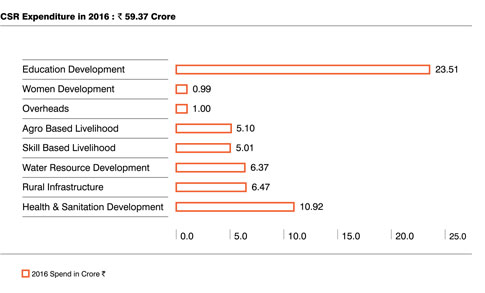 Ambuja Cement Foundation operates
in 21 locations in 11 states. It works
towards empowering communities
in the areas of water resource
management, agro- and skillbased
livelihoods, comprehensive
healthcare, education and women’s
empowerment. ACF’s programmes
are tailor-made for the specific
geography and conditions of each
location where it works. It adopts a
participatory approach towards all its
stakeholders, be they Government,
non-government, corporate entities
or the community. Its mission is to
‘energise, involve and engage’. It also works in partnership with other organisations who
share our dream of working with the communities at our
various locations.
Ambuja Cement Foundation operates
in 21 locations in 11 states. It works
towards empowering communities
in the areas of water resource
management, agro- and skillbased
livelihoods, comprehensive
healthcare, education and women’s
empowerment. ACF’s programmes
are tailor-made for the specific
geography and conditions of each
location where it works. It adopts a
participatory approach towards all its
stakeholders, be they Government,
non-government, corporate entities
or the community. Its mission is to
‘energise, involve and engage’. It also works in partnership with other organisations who
share our dream of working with the communities at our
various locations.
ACF currently reaches out to over 1.8 million people across our 21 sites. When a plant is contemplated at a location, ACF first conducts a needs assessment of the prospective project affected persons in the area. Only after that has been done satisfactorily does Ambuja Cement enter the location to construct the plant. This creates confidence about our intentions among the people, and gives us the social license to operate there along with the people’s participation in our projects. GRI 413 (1, 2)
Before commencing any programme with the community, ACF conducts ‘Participatory Rural Appraisals’ (PRAs). All stakeholders are included in open discussions with the Company through various forums where projects are planned and development initiatives reviewed. They provide a platform to address stakeholder concerns and develop a proactive plan of action for enhanced business sustainability. ‘Community Advisory Panels’ (CAPs) function at all Ambuja Cement sites. They comprise community and Company members who meet regularly to discuss and address the community’s concerns about our operations.
The Company’s CSR initiatives across all locations are rated through the ‘Social Engagement Scorecard’ (SES).Detailed group discussions and interviews give us feedback about the work done. ACF prepares annual ‘Community Engagement Plans’ (CEPs) in close consultation with the community and the relevant plant teams; the plans are based on the concerns raised during the CAP and other stakeholder meetings. They integrate the people’s needs with our business. ‘Site Specific Impact Assessments’ (SSIAs) are conducted cyclically at all sites to understand the needs and concerns of all the stakeholders. They cover human rights, labour rights and stakeholder conduct. The first SSIA cycle was completed in 2015; the second cycle was initiated in September 2016. The SSIAs enable systematic reduction of risk and ensure sustainability in our operations. GRI 413-1
Water Resource Management
Water is the most critical and vulnerable resource in all our geographies. ACF’s initial work in 1993 began with water sustainability for our communities. Taking into account the needs of the community, the programme began with salinity management in Gujarat. It gradually expanded to other locations, always striving to give back more water than that used in its operations. ACF’s strategies and programmes are tailor-made to the specific topography of the region and the needs of the people. It tackles problems holistically, building infrastructure for mass water harvesting, mobilising and collectivising farmers, and promoting drinking water solutions to ensure sufficient drinking water for the community. ACF’s community based water projects have at least one of the following objectives:
- To increase the availability of water through harvesting and recharging of water bodies.
- To revive and protect local traditional water bodies.
- To stop salinity ingress into fresh groundwater in coastal areas.
- To create awareness about the judicious utilisation of precious water
During the year, an independent study was carried out by Sustainable Square India Pvt. Ltd. to assess the social return on investment (SROI) of ACF’s water resource management initiatives.
The study showed a social return of thirteen times in Kodinar and five times in Rabriyawas.
The SROI study measured social, environmental and economic outcomes achieved as a ripple effect of ACF’s work, translated into monetary value.
ACF’s water resource management model focuses on three areas: water harvesting and conservation (check dams, interlinking of rivers, watershed development, etc.); drinking water (roof rain water harvesting structures, pond-deepening, in-village distribution systems, water quality surveillance, etc.); and optimum utilisation (water user associations, participatory irrigation management and promotion of micro irrigation).
Water management projects are planned and executed in consultation with community institutions like water user associations (WUAs) or pani samitis. These groups take charge of post project repair and maintenance of structures.
In May 2016, the ACF team conducted a situational assessment of water availability in the villages around our Kodinar plant. The results showed that while other villages were labelled as ‘severe drought affected’, ACF’s villages were able to cope with the water shortage, reap three crops, and have sufficient fodder for cattle due to efficient water resource management interventions. Where ACF had no presence, normal life was greatly disrupted, with the farmers unable to reap more than one crop and having to purchase fodder.
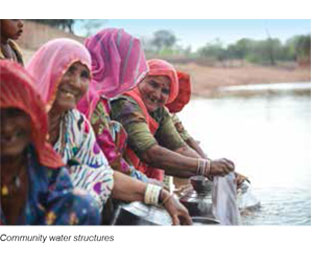 Our work on water resource management has had a
ripple effect on the lives of the people. Assured water
in homes has significantly reduced the drudgery of
women and children who would earlier spend most of
their productive hours carrying water for drinking and
agricultural purposes. The availability of drinking water
has been sustained through various state-specific
water conservation programmes that are carried out in
collaboration with the state governments, local NGOs
and academic institutions. In recognition of its work,
Ambuja Cements Limited received an assurance of
being 5.5 times water positive from DNV-GL in 2016,
making it the only water positive cement company in
India. Our efforts also won us the FICCI CSR Award in
December 2016.
Our work on water resource management has had a
ripple effect on the lives of the people. Assured water
in homes has significantly reduced the drudgery of
women and children who would earlier spend most of
their productive hours carrying water for drinking and
agricultural purposes. The availability of drinking water
has been sustained through various state-specific
water conservation programmes that are carried out in
collaboration with the state governments, local NGOs
and academic institutions. In recognition of its work,
Ambuja Cements Limited received an assurance of
being 5.5 times water positive from DNV-GL in 2016,
making it the only water positive cement company in
India. Our efforts also won us the FICCI CSR Award in
December 2016.
Promoting Agro-based Livelihoods
Agriculture is the main source of livelihood and the primary occupation of our rural communities. Ambuja Cement Foundation endeavours to make it profitable by introducing a scientific package of agricultural practices and building the collective capacity of the farmers. Its agro-based livelihood programme promotes end-to-end solutions through a holistic approach. The interventions are aimed at bridging the gap between traditional farming practices and preferred, scientific practices. Farmers in Kodinar and Rajasthan are now able to grow more than one crop in their fields. The drip and sprinkler method of irrigation, replacing flood irrigation, has ensured optimal utilisation of water in the fields. More than one lakh farmers have benefitted from our multi-pronged approach to improve agro-based livelihoods.
‘Better Cotton Initiative’ (BCI) is a global initiative for sustainable cotton production. ACF has introduced BCI to more than 44,000 cotton farmers, covering over 53,000 ha of land. Our efforts have improved the work ethics of the farmers on their farms, ensured the health of the soil, brought in higher profit margins and established safe environment practices. The BCI project began with 2,500 farmers in 2010; that number rose to over 44,000 farmers in 2016, the highest number among BCI-implementing agencies in India. In 2016, BCI farmers recorded a significant 22% increase in their net income across locations, arising out of a 24% reduction in the input of pesticides and fertilizers and 17% reduction in the use of water, realising a 14% reduction in the cost of cultivation. These efforts have brought us recognition on the global stage.
In 2016, Ambuja Cement Foundation was elected as a member of BCI’s Global Council and will now play an instrumental role in setting strategic direction for achieving better cotton and empowering farmers.
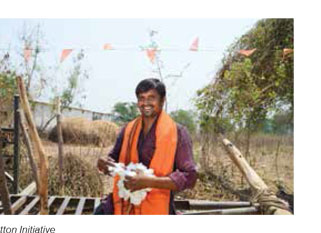 ACF undertakes location-specific programmes to
ensure geographic suitability. Programmes like organic
farming in the north & ‘systematic rice intensification’
(SRI) in the east have led to better production. SRI
achieves a better yield of rice with limited water use.
It has given positive results in Bhatapara, Sankrail
and Farakka. Our SRI intervention began with around
174 farmers in 2009; to date it has reached out to over
10,200 farmers cumulatively.
ACF undertakes location-specific programmes to
ensure geographic suitability. Programmes like organic
farming in the north & ‘systematic rice intensification’
(SRI) in the east have led to better production. SRI
achieves a better yield of rice with limited water use.
It has given positive results in Bhatapara, Sankrail
and Farakka. Our SRI intervention began with around
174 farmers in 2009; to date it has reached out to over
10,200 farmers cumulatively.
It was observed that in Sankrail and Farakka, many ponds were lying without use since water was available in plenty. To make good use of this water, ACF promoted fish culture among farmers in the eastern regions. This proved to be a good alternative source of income for the farmers.
Similarly, animal husbandry is an important alternative source of income for many rural families. ACF’s animal husbandry programme for the community strives to keep their cattle healthy. Regular health camps are held for the cattle, coupled with training of farmers on the importance of green fodder and animal feed. In Darlaghat, village women were trained as para-vets, known locally as pashu swasthya sevikas (PSS’s), to provide animal care in their villages. Currently there are 23 PSS’s servicing 45 villages in Darlaghat.
ACF also focuses on building the collective bargaining power of the farmers by creating farmer producer organisations (FPOs). Currently there are 13 FPOs that are procuring inputs at a lower cost and providing them to the farmers in remote areas at reasonable prices. They are gradually ascending to the next step of the agricultural value chain by building market supply linkages. By the end of 2016 there were 49 such linkages.
Most Ambuja Cement plants are located in rural geographies, with agricultural fields neighbouring the plant areas. Over the years it was observed that in the absence of any other mechanism, farmers would often burn crop residue in their fields, generating significant amounts of CO2 emissions and also depriving their own farm soil of its essential nutrients. This was realised as a business opportunity wherein farmers were invited to supply this crop residue as fuel in Company kilns, in return for a competent market price. FPOs in Ropar, Rabriyawas, Darlaghat, Chandrapur and Kodinar partnered with Ambuja Cement for the use of biomass as an alternative fuel resource (AFR). Under the project, The Company procures biomass directly from the FPOs. Farmer groups are paid to provide bio-wastes like sugarcane trash, cotton stalk, wheat straw and other crop residues which are then used to replace conventional fuels in Ambuja Cement kilns. This is an example of the symbiotic relationship between the Company and the community that aids the former in its drive to remain the most sustainable company in the industry, and augments the income of the farmers. In the year 2016, 16,292 MT of biomass has been supplied to Ambuja Cement kilns to replace traditional fuels, through the farmers associated with ACF. The FPOs at Rabriyawas and Ropar earned whopping profits of ` 1,94,300 and ` 1,56,023, respectively during the year. The collective profits of the FPOs in this venture were ` 4,20, 000 in 2016.
Promoting Skill-based Livelihoods
ACF primarily operates in rural locations, where agriculture is the main source of income for most families. With increasing population, there has been pressure on the land to increase its productivity over the years. ACF introduced Skill and Entrepreneurship Development Institutes (SEDIs) in 2006, to provide vocational training to rural youth to obtain gainful employment and aid their household incomes, easing the strain on agriculture. Skill training has now become part of the national agenda, with the Prime Minister’s call to make India the ‘skill capital of the world’.
By the end of 2016, ACF established 17 SEDIs in 10 states and successfully trained over 30,000 rural youth. Seventy four per cent of them were placed in various industries such as hospitality; driving; nursing; security; retail; automobile; electrical; construction; carpentry; beauty; garment making; fitting and welding; and computer training. ACF prepares the rural youth to face the challenges of the professional world by developing their vocational skills. SEDI graduates are assisted in starting their own businesses; 2,915 enterprises have been formed till date.
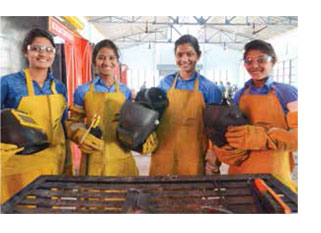 Besides providing training in different trades, the SEDI
students are tutored in computer operation, English
and soft skills. Many SEDI courses are governmentaffiliated.
To further its skill training agenda, ACF works in partnership with various institutions, depending
upon the feasibility of their locations. These may
be government institutions such as National Skill
Development Corporation (NSDC) and Industrial
Training Institutes (ITIs); non government institutions
such as Sadvichar Parivar and Vishwa Yuva Kendra;
and corporate houses such as the Taj Group of Hotels
and ADOR Welding Academy.
Besides providing training in different trades, the SEDI
students are tutored in computer operation, English
and soft skills. Many SEDI courses are governmentaffiliated.
To further its skill training agenda, ACF works in partnership with various institutions, depending
upon the feasibility of their locations. These may
be government institutions such as National Skill
Development Corporation (NSDC) and Industrial
Training Institutes (ITIs); non government institutions
such as Sadvichar Parivar and Vishwa Yuva Kendra;
and corporate houses such as the Taj Group of Hotels
and ADOR Welding Academy.
One such partnership is that with Schneider Electrical Foundation. Schneider, an energy management company, partners with 14 of our SEDIs not just with a monetary contribution, but also by using its expertise to set up electrical labs. These labs are used to train students as electricians.
Safety being an overarching value in Ambuja Cement, the SEDIs collaborate with the Company’s Health and Safety department to make sure that regular and thorough safety training is provided to all trainees. Personal protective equipment (PPE) is mandatory for all trainees during practical sessions in specific trades such as welding and electrical training. The SEDIs’ endeavour is to make safety an integral part of the trainees’ lives so that they value their own safety as well as that of others.
The SEDIs also help the Company’s employees and contract staff to upgrade their skills and get certification.
Comprehensive Healthcare
It is important for us to impart our overarching values of health and safety to the communities with whom we work. We are working sincerely to develop a healthy and thriving community around all our sites. Our Initial activities addressed the immediate clinical needs of the people through curative care. Gradually, the programme developed to promote health, prevent disease and provide preventive and curative care. ACF works extensively to promote comprehensive healthcare among its communities.
ACF’s health projects are implemented in close coordination with the public health departments, panchayats and village development committees; they are led by a cadre of ACF-trained voluntary health workers called ‘sakhis’.
In 2016, ACF undertook a study in collaboration with a reputed research agency to test the knowledge and skill of our sakhis in comparison with accredited social health activists (ASHAs). The study clearly demonstrated better knowledge and skill sets amongst the sakhis who were trained by ACF.
ACF works extensively towards the prevention of HIV and AIDS in and around Ambuja Cement plants. Efforts are made to reduce the stigma on persons affected by the disease. Several projects are implemented in collaboration with state-level AIDS control societies and corporate partners to reach out to over 1,15,000 vulnerable people. Ambuja Cement employees volunteer as master trainers to reach out to truck drivers (one of the most vulnerable groups), contract workers and other employees who are an integral part of the Company’s operations.
Ambuja Cement is aligned with the national agenda of promoting sanitation among the people; we are mobilising our communities to build clean and healthy villages. ACF facilitated the formation of village development committees (VDCs) who spearhead the cause of sanitation. We have instituted a ‘Communityled Total Sanitation’ (CLTS) project, through which the entire community participates in better sanitation practices. The objective of the project is to engage with the community beyond the construction and repair of toilets, and bring about behavioural changes in their sanitation habits. These behavioural changes are largely steered by women and children, who have become the frontrunners of our sanitation drive. Women’s federations in Chandrapur and Kodinar, with 490 self help groups (SHGs) and over 6,100 members, have played an instrumental role in encouraging people to construct toilets and adopt hygienic practices in their households.
ACF has covered over 12,000 households and 177 schools under its sanitation initiative. In 2016, we supported 6,107 households in toilet construction.
ACF works towards strengthening village level institutions and health systems like ASHA, anganwadis, ANMs, VHSNCs, and PRIs to make the villagers self-reliant.
In 2014, ACF conducted a baseline survey in 232 core villages in 15 locations. The survey showed that only 57% of households had toilet facilities, several of which were unused. Today, more than 70% of the households in villages around Ambuja Cement plants have toilets. Seventy three villages have achieved total sanitation with a toilet for every household.
Women’s Empowerment
Our women’s empowerment programme is an independent entity; yet it is woven into all our other programmes. Our initiatives include giving women assured access to water, developing a cadre that can provide the community with health and education, training them in various skills, and providing them with opportunities to demonstrate leadership. Many women now have access to finance and run their own small businesses. This has boosted their confidence immensely.
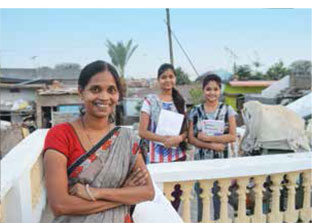 In Kodinar, Chandrapur, Darlaghat and Rabriyawas,
small SHG groups of 15-20 women have expanded to
form women’s federations. The Sorath Mahila Sahkari
Mandali in Kodinar has opened a retail outlet and runs
a stitching course for its members in order to promote
entrepreneurship. Its members are provided with
support in times of emergency. Their work has been
recognised by the Government who has offered them
an insurance scheme.
In Kodinar, Chandrapur, Darlaghat and Rabriyawas,
small SHG groups of 15-20 women have expanded to
form women’s federations. The Sorath Mahila Sahkari
Mandali in Kodinar has opened a retail outlet and runs
a stitching course for its members in order to promote
entrepreneurship. Its members are provided with
support in times of emergency. Their work has been
recognised by the Government who has offered them
an insurance scheme.
These initiatives have played a critical role in elevating the status of women in their respective communities. Since ACF has always adopted a participatory approach, the changes have been internalised by the community and are irreversible. The work of the women’s federations is aligned with the national Swachhata Mission. They carry out sanitation programmes and manage a revolving fund that helps needy families purchase material for the construction of toilet blocks.
Promoting Education
Many of the workers serving Ambuja Cement are migrants from other regions. Their children need a good education. ACF promotes education through various programmes across its locations. Its programmes involve innovative teaching and learning methodologies in schools, coupled with teachertraining. This makes the subjects interesting and easy for the children to understand. ACF also trained children to become balmitras, who support their peers in Maths and Science. Infrastructural support like establishment of science centres, libraries, etc. is provided by the Company. ACF also runs non-formal education (NFE) centres that provide basic literacy in areas with a high number of out of school children. Such children are given opportunities to enter the formal education system.
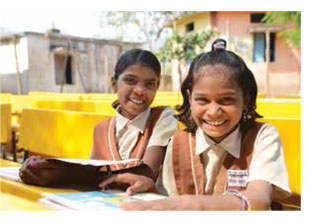 Ambuja Manovikas Kendra (AMK) is the only facility
for special children in the entire district of Ropar. Its
student strength is about 100 trainees, all of whom are mentally challenged. They are often sidelined
by society and treated as a liability. AMK provides
them with an environment that is conducive to their
individual needs. Our experience shows that with early
intervention and intensive training, most of them can be
rehabilitated. Systematic therapies and regular training
combined with counselling for both the students and
their families have yielded encouraging results.
Ambuja Manovikas Kendra (AMK) is the only facility
for special children in the entire district of Ropar. Its
student strength is about 100 trainees, all of whom are mentally challenged. They are often sidelined
by society and treated as a liability. AMK provides
them with an environment that is conducive to their
individual needs. Our experience shows that with early
intervention and intensive training, most of them can be
rehabilitated. Systematic therapies and regular training
combined with counselling for both the students and
their families have yielded encouraging results.
AMK children have responded so well to our interventions that many of them have gained recognition on national and international platforms. They have displayed special inclination and talent towards sports and the arts, and have won several accolades. Seven AMK children, in the last three cycles, have won medals at the World Special Olympics. The AMK team has been winning the championship trophy at the Punjab State Special Olympics for the last 11 years. These results have served as a benchmark for other AMK trainees to emulate, overcoming the prejudice that the differently-abled often have to encounter.
Making Internal Monitoring Robust
The Company has set up a separate internal programme monitoring and research cell which focuses on data management and impact assessment of our CSR programmes. The programmes are monitored on a quarterly and annual basis using a systematic monitoring framework used by 17 locations to report their processes and achievements. Systematic assessments, research studies and evaluation are conducted to develop need-based programmes and make mid-course corrections to existing programmes.
For more information on our CSR activities please visit: www.ambujacementfoundation.org